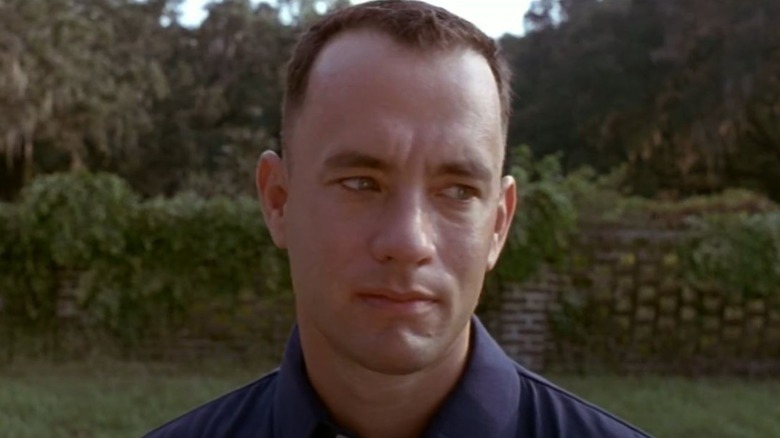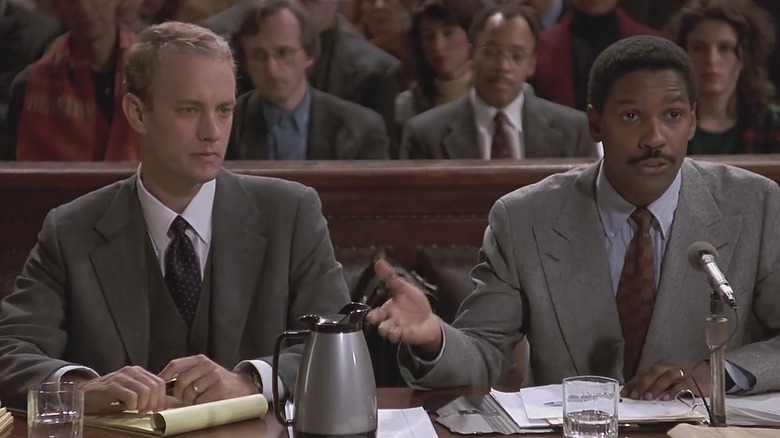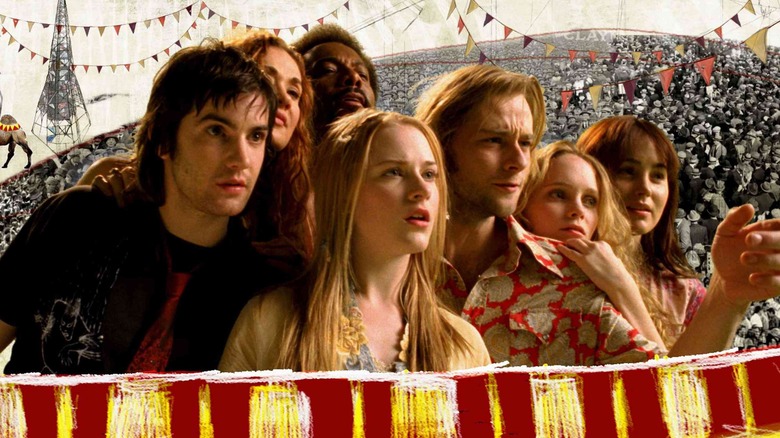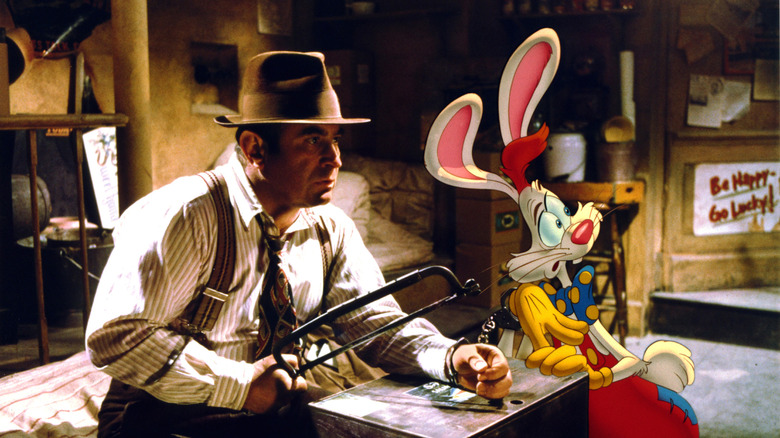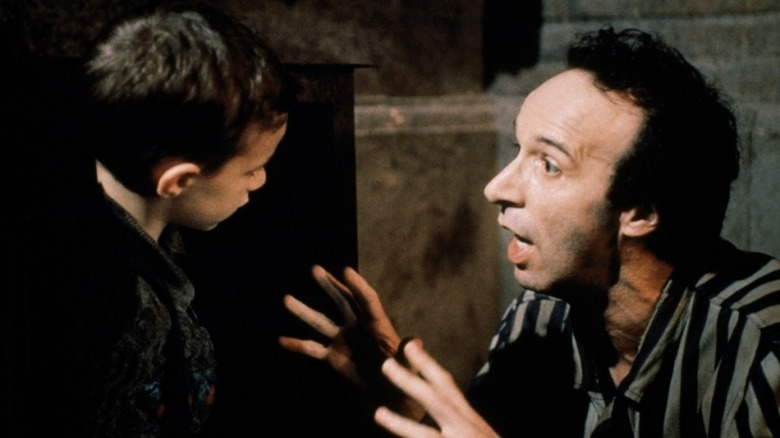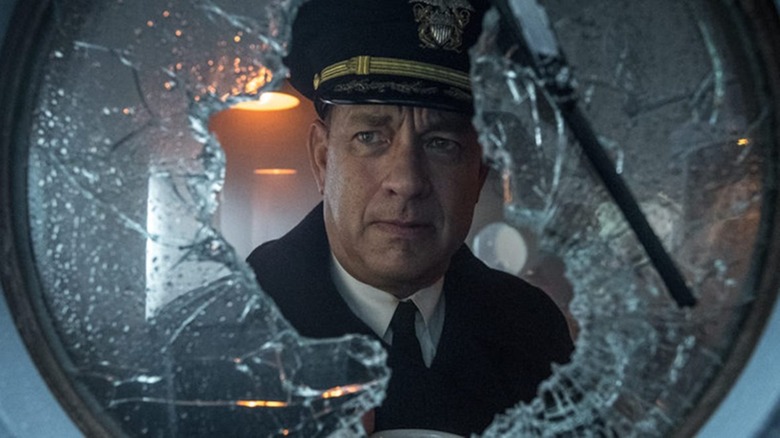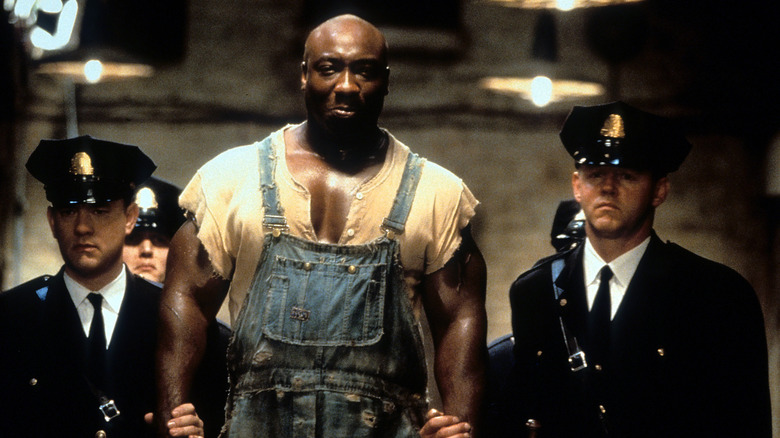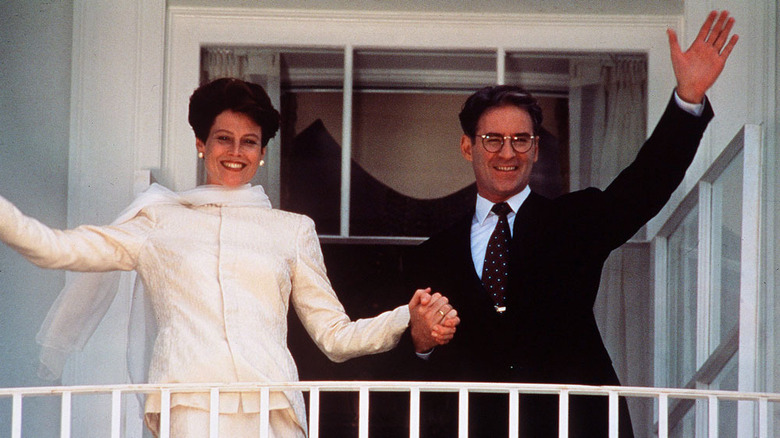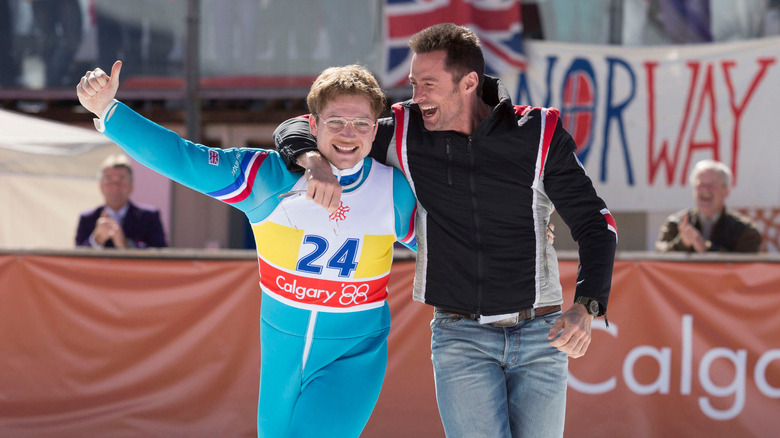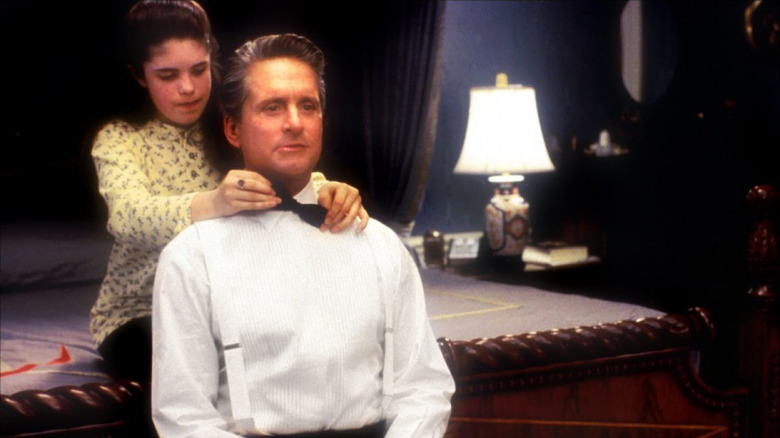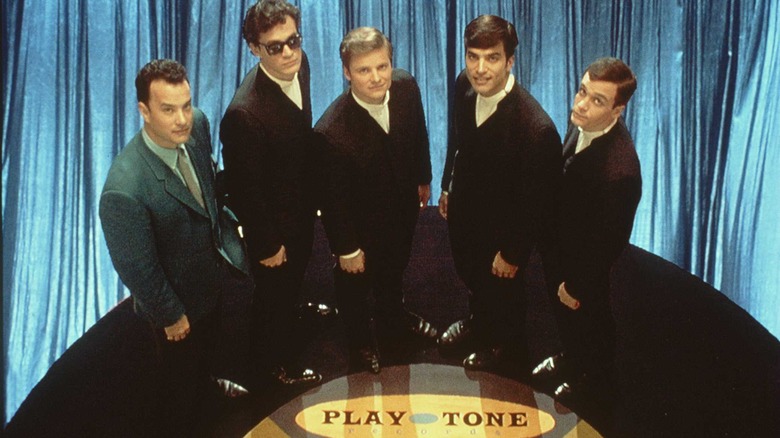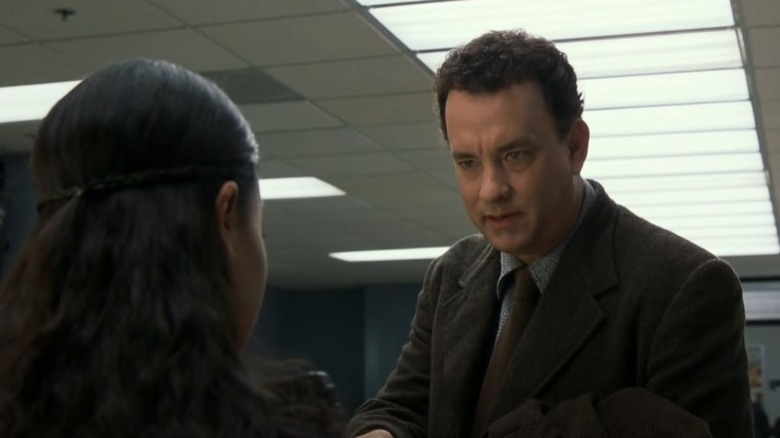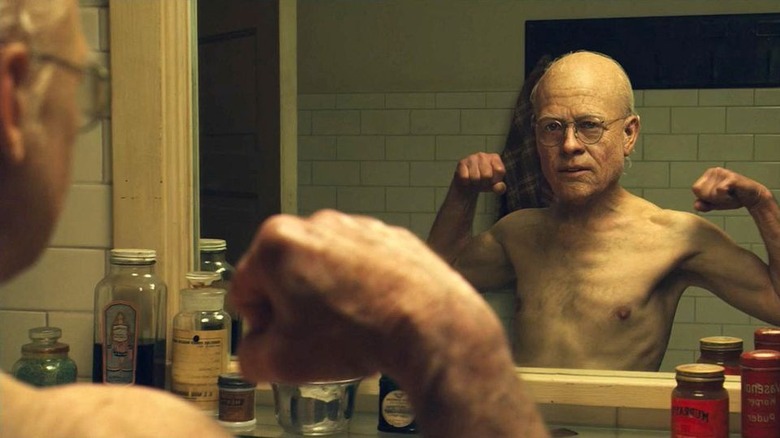Movies Like Forrest Gump That Are Definitely Worth A Watch
"Forrest Gump" is one of the most beloved films of the 1990s. The crowd-pleaser has endured as a favorite among audiences with its heartfelt themes, groundbreaking technical innovation, and Tom Hanks's brilliant performance as the titular character. Robert Zemeckis's adaptation of Winston Groom's 1986 novel is the rare film that inspires tears and laughter in equal measure.
"Forrest Gump" follows the exploits of a mentally challenged man across several decades as he inadvertently influences key events in American history. Icons like Elvis Presley and U.S. Presidents John F. Kennedy, Lyndon Johnson, and Richard Nixon were recreated through Zemeckis's innovative visual effects. Forrest takes part in many key historical moments, including the Vietnam War and the subsequent capital riots it inspired. The story is fictitious, but actual historical events inspired some of Forrest's adventures.
The film was a sensation in 1994, and became both a box office smash hit and a critical success. "Forrest Gump" won six Academy Awards, including Best Picture, Best Director for Zemeckis, and Best Actor for Hanks. Many of the film's lines, including "life is like a box of chocolates," have been adopted into popular culture. At one point screenwriter Eric Roth began developing ideas for a sequel, but ultimately decided the optimistic view of American life wouldn't fit in a post-9/11 world.
The themes of kindness and empathy make "Forrest Gump" a film worth introducing to future generations. If you love "Forrest Gump," you may also enjoy these other great films.
Philadelphia
Tom Hanks is one of the most enduringly likeable actors in Hollywood, and generates empathy for his characters thanks to the warm presence he brings to the screen. Hanks had been a breakout comedy star of the '80s, but in the '90s he began taking on more serious roles. A year before "Forrest Gump," Hanks starred in Jonathan Demme's emotional legal thriller "Philadelphia." Hanks won the Oscar for Best Actor for both films, becoming the first actor to do so since Spencer Tracy for "Captains Courageous" in 1937 and "Boys Town" in 1938.
Hanks stars as whip smart lawyer Andy Beckett, whose kindhearted nature makes him stand out among the cynical senior partners at his corporate law firm. Beckett is known for his diligence and has led many successful cases, but he's suddenly fired for misplacing critical documents. Beckett suspects that his termination had nothing to do with his track record; the homophobic partners realized he has AIDS, and framed him for incompetence. Beckett is dying, but he wants to retain his dignity and decides to sue.
Beckett hires his chief rival Joe Miller (Denzel Washington) to represent him. Miller is close-minded, but he becomes emotionally involved in defending Beckett's legacy. Hanks is riveting throughout, and it's difficult to watch his physical state deplete as the disease symptoms grow more severe. Like "Forrest Gump," "Philadelphia" is an overwhelming emotional experience. The themes of respect and open-mindedness are integral to both films.
Across the Universe
"Forrest Gump" explores the impacts of major social, political, and economic changes throughout the '60s and '70s through the prism of one character's perspective. Forrest is involved with many of the major events, and Jenny (Robin Wright) joins an activist cause that results in him to questioning Vietnam service. This critical period in American history benefits from the perspective of compelling characters, and the 2007 musical "Across the Universe" explores a relatable group of young people affected by the conflict.
Jude (Jim Sturgess) is a British dock worker who travels to the United States in search of his long lost father. He falls in love with the American college student Lucy (Evan Rachel Wood), and becomes best friends with Lucy's rebellious brother Max (Joe Anderson). Max encourages the reclusive Jude to become more social, and they abandon the constraints of college life to live independently in New York City. With their loyal group of roommates, Jude, Lucy, and Max are exposed to a diverse artistic community. Unfortunately, abandoning school means Max can be drafted, and he's sent overseas. Lucy joins a counter-cultural resistance movement to protest the war, but her strict dedication to the cause disorients Jude.
While these events are treated with sensitivity, "Across the Universe" is a time capsule that "Forrest Gump" fans may enjoy. "Forrest Gump" also has a terrific soundtrack, and "Across the Universe" utilizes classic tunes from The Beatles to tell its story.
Who Framed Roger Rabbit
"Forrest Gump" director Robert Zemeckis is one of the foremost innovators of special effects in modern cinema. Zemeckis developed cutting edge motion capture technology with his animated films "The Polar Express," "Beowulf," and "A Christmas Carol," and has continued to reinvent the use of 3D with the digital scoping in 2015's "The Walk." However, while those films put meticulous effort into their visuals, their stories were lacking. The recreation of historical figures in "Forrest Gump" was groundbreaking, but it was essential to telling the story.
When paired with an engaging narrative, Zemeckis's technical expertise can really shine. His 1988 classic "Who Framed Roger Rabbit" seamlessly integrates characters from classic cartoons into a live-action story, and puts them in a fun mystery adventure. The animated Roger Rabbit (Charles Fleischer) is wrongfully accused of murder, and seeks the help of private eye Eddie Valiant (Bob Hoskins). It's a hilarious buddy adventure, as the stoney Valiant grows irritated with Roger's slapstick comic antics. Hoskins channeled Old Hollywood noir icons with his grim performance, and it's amusing to see that character archetype trapped in a literal cartoon.
Like "Forrest Gump," "Who Framed Roger Rabbit" is a crowd pleasing family adventure that features surprisingly mature elements. The blatant sexuality of Roger's girlfriend Jessica Rabbit (Kathleen Turner) and frequently graphic (albeit animated) violence make "Who Framed Roger Rabbit" the rare film that appeals to both children and adults. While the disparity could have felt awkward, Zemeckis makes the tonal balance work.
Life is Beautiful
"Forrest Gump" is a brilliant combination of comedy and drama. It approaches serious themes of mental illness, war, abuse, and addiction, and the more humorous elements don't detract from the gravity of the historical events being depicted. It easily could have felt insensitive, but Forrest's optimistic worldview makes the tonal fluctuations feel authentic. Crafting a lighthearted story amidst a devastating world event is something writer/director Roberto Benigni tried with his 1998 classic "Life is Beautiful." Benigni also starred in the film, and like Hanks he won the Academy Award for Best Actor with his endearing, heartfelt performance.
The young Jewish man Guido Orefice (Benigni) travels to Tuscany in search of work, but instead falls in love with the gentile woman Dora (Nicoletta Braschi). The first half of the film is essentially a fairy tale; Guido charms Dora with his amusing antics, concocting grand signals of affection, and the two are later married and have a son, Giosuè (Giorgio Cantarini). However, the loving family is eventually captured by Nazi soldiers and sent to a concentration camp.
In order to shield his son from the death and disparity that surround them, Guido creates an elaborate story that they are part of a giant game and that all of their fellow prisoners are participants. Watching Guido maintain the deception as his physical state depletes is heartbreaking. Like Forrest, Guido is a great storyteller, and "Life is Beautiful" shows the power stories have to give people hope.
Greyhound
Hanks's affinity for true stories of heroism is evident within "Forrest Gump," as Forrest's service in the Vietnam War alongside Lieutenant Dan (Gary Sinise) is treated with earnestness and respect for the military. Hanks would star in many true stories of American heroism throughout his career, including his memorable turns in "Apollo 13," "Charlie Wilson's War," "Captain Phillips," "Bridge of Spies," "Sully," and "The Post." In 2020, Hanks combined his unmatched star power with a screenplay he personally penned for a thrilling true story of courage under fire.
Hanks adapted the 1995 World War II novel "The Good Shepherd" into the screenplay for "Greyhound," which follows a first time US Navy submarine commander during a critical mission in 1942. Although not directly based on a true story, Hanks did meticulous research to make his script as accurate as possible. An opening scene reveals a romantic relationship between Ernest Krause (Hanks) and the woman Evelyn Frechette (Elisabeth Shue), but the rest of the story is set entirely on the naval vessels as Krause's crew aims to protect a merchant crew from attacks by Nazi ships.
It's an action heavy film, but in 90 minutes the relationships are thoroughly developed as the team bonds. Hanks shows the humility of Krause's character; his crew is always respectful of his leadership, but he is resilient during his first time commanding. The emotional final moments in which Krause reflects on the lives lost and reconnects with Frechette are very touching.
The Green Mile
"Forrest Gump" was a powerful depiction of hope amidst devastating circumstances. Forrest overcomes social barriers to make great accomplishments, and he treats the unpredictable nature of his life with optimism. There are many tragedies within Forest's life, including the deaths of both Jenny (Robin Wright) and his mother (Sally Field). The gradual build up to these moments makes them heartbreaking to watch.
Hanks delivered another stirring depiction of loss in the 1999 Stephen King adaptation "The Green Mile." Directed by "The Shawshank Redemption" helmer Frank Darabount, "The Green Mile" also centers on the unusual friendships that are formed in prison. Hanks stars as death row prison guard Paul Edgecomb, who is assigned to watch over the convicted murderer John Coffey (Michael Clarke Duncan). Coffey is a physically imposing man, but has a gentle spirit similar to Forrest. Edgecomb begins to question if Coffey is actually innocent; he can't imagine that the kind-hearted man is guilty of brutally murdering two young girls.
Edgecomb is even more surprised to learn that Coffey possesses magical powers of healing, and cures him of a debilitating infection. Realizing that Coffey's attempts to save the dying children were misinterpreted as murder, he bands with fellow guards and Coffey's friends in prison to protest his execution. Like "Forrest Gump," "The Green Mile" is not a short film, but its three hour runtime culminates with a powerful conclusion.
Dave
"Forrest Gump" is aware of the political landscape it depicts, but the presidential elements are mostly played with a light comic touch. Forrest interacts with many U.S. Presidents, speaking with John F. Kennedy prior to his assassination and receiving the Medal of Honor from Lyndon B. Johnson. In one of the film's biggest laughs, Richard Nixon offers to put Forrest in a luxury hotel suite, and he ends up calling the cops and inadvertently sparking the Watergate scandal. However, Forrest solemnly reflects on how violent America's history became, and shows respect for the democratic process.
The 1993 political satire "Dave" walks a similar line between situational comedy and reverence for elected office. Ivan Reitman's film stars Kevin Kline as two identical characters; one is the corrupt President William Harrison Mitchell, and the other a friendly working class man named Dave. Mitchell suffers a heart attack while having an extramarital affair, and the scheming White House Chief of Staff Bob Alexander (Frank Langella) and Communications Director Alan Reed (Kevin Dunn) plot to install Dave as a figurehead in order to avoid a national crisis. Alexander aims to take the Presidency for himself. However, Dave's kindly nature shocks the public, and he grows more popular than Mitchell ever was. Mitchell had a failing marriage to First Lady Ellen (Sigourney Weaver), but Ellen begins to fall for Dave during the illusion.
Eddie the Eagle
One of Forrest's early moments of triumph is when he leads his high school football team to victory. The 2016 biopic "Eddie the Eagle" is one of the best sports films of the past decade, and unfortunately it didn't receive the acclaim it deserved during its initial release. Like "Forrest Gump," it stars an unlikely hero who is constantly forced to silence his doubters.
Since childhood, Michael Edwards (Taron Egerton) has dreamed of being an Olympic champion like all of his heroes. Edwards' uncoordinated nature makes him a frequent target for school bullies, but he perseveres and lands a meeting with Great Britain's Olympic committee. Unfortunately, Edwards isn't skilled at any of the Summer Games events he tries, and he's rejected from joining any of the existing teams. However, he discovers a wrinkle; Great Britain has not had an Olympic ski jumping team since the 1920s, and Edwards decides to commit himself to the lesser-known sport.
Edwards finds a mentor in disgraced former champion Bronson Peary (Hugh Jackman), who now works as a lowly snow groomer. Peary was once renowned for his skills, but he was labeled dishonorable and descended into alcoholism. Peary seeks redemption and Edwards seeks victory, and as a result they make a great team. Egerton and Jackman have an amusing back-and-forth, as Peary utilizes non-traditional workouts to train Edwards for his ambitious goals.
The American President
The romance between Forrest and Jenny is very affecting, as the two overcome barriers to reach each other, yet still get only a few moments of intimacy. There's a '90s optimism to their political differences; Jenny joins anti-Vietnam protests when Forrest is in combat, but they realize they're working towards the same goal. Although their relationship ends on a tragic note, neither characters' lives would have been the same otherwise.
This deeply affectionate style of romantic storytelling was epitomized by director Rob Reiner with his delightful 1995 classic "The American President." Like "Forrest Gump," it doesn't skimp on the complex details of the political process; the screenplay from Aaron Sorkin tackled hot button issues that were frequent talking points during the Clinton administration. The film follows United States President Andrew Shepherd (Michael Douglas), who lost his wife during his initial run for office. Shepard has been relatively popular and prepares to launch his re-election campaign, but his life is changed when he meets the outspoken lobbyist Sydney Ellen Wade (Annette Bening). Wade challenges his viewpoints, but they find themselves deeply in love.
Of course, a Presidential romance presents innumerable challenges, as Shepard becomes hounded by the media as he attempts to solve an overseas crisis. Senator Bob Rumson (Richard Dreyfuss) attempts to villainize the new couple, and watching Shepard defend Ellen's honor is inspiring.
That Thing You Do!
"Forrest Gump" has a terrific soundtrack, encapsulating three decades of great American music and intertwining the iconic songs within its depiction of history. In one of the earliest scenes, a young Forrest inadvertently inspires Elvis Presley with his goofy dance moves. Hanks continued his passion for rock 'n' roll when he made his directorial debut with 1996's "That Thing You Do!"
The film depicts the rise and fall of a "one hit wonder" pop band. Drummer Guy Patterson (Tom Everett Scott) works at his father's home retail store, but dreams of pursuing his love of music professionally. Creating the band The Wonders, Patterson invites his friends Jimmy Mattingly (Johnathon Schaech) and Lenny Haise (Steve Zahn) to perform at a local talent show, where he debuts his original song "That Thing You Do!" The track is a sensation, and the Wonders find themselves on the path to stardom.
Like "Forrest Gump," "That Thing You Do!" has a memorable cast of supporting players that support the protagonists' journey and add humor. Hanks himself has a hilarious role as the band's manager Amos White, and Guy's romantic pursuits of Jimmy's girlfriend Faye Dolan (Liv Tyler) creates tension within the band.
The Terminal
Despite the film's dramatic sensibilities, Hanks utilized many of the comedic skills he'd built his early career on in "Forrest Gump." Hanks would mostly play serious characters in the next decade, but he returned to a more eccentric part in Steven Spielberg's heartwarming 2004 dramedy "The Terminal." Similar to "Forrest Gump," Hanks plays a good-hearted character who gradually earns the respect of those around him, even when they can't understand a word he's saying.
Hanks's character Viktor Navorski hails from the nation of Krakozhia, and travels to the United States in order to visit a landmark nightclub that he learned about from his father. Due to a political crisis in his home country, Viktor's passport is invalidated and he becomes legally unable to leave John F. Kennedy International Airport. Viktor speaks little English and has no American currency; he finds creative means to survive, taking coins from a slot machine to pay for meals. Viktor is an optimist who has a positive impact on the other travelers and staff in the airport.
The Curious Case of Benjamin Button
"The Curious Case of Benjamin Button" is the closest thing to a modern "Forrest Gump." It's also a film that tells its character's life story over several decades, framed through his relation to key historical events and a failed romance that only concludes in heartbreak. While David Fincher's film is much darker, it utilizes similar wondrous visual effects that blend seamlessly with the incredible lead performance by Brad Pitt.
Benjamin Button is born in 1918, but the infant child has the face of an elderly man. Benjamin ages backwards, and develops more youthful qualities as he grows older. Like Forrest, it's a childhood romance that inspires Benjamin's journey; he's smitten with his wholesome neighbor Daisy Fuller, following her from New Orleans to New Jersey when she becomes an adult (Cate Blanchett). Daisy expresses her wonderment at Benjamin's shifting appearance, and the two try to make their relationship work during the limited period where they look the same age.
